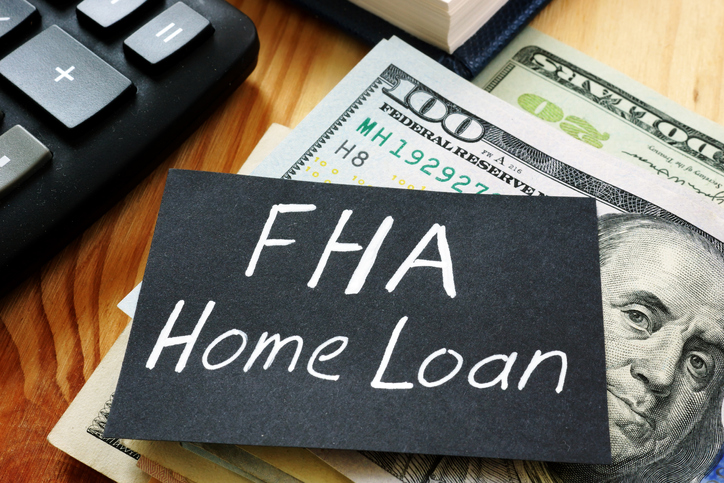Common Pitfalls of FHA Loans
For many first-time homebuyers, an FHA loan is a great starting point. It’s known for being easier to get approved for and a perfect program for people who are new to buying homes. But getting an FHA loan isn’t always easy.
FHA loans are great for people who might have trouble getting a regular mortgage, but there are still things that can lower your chances of getting one. Things like your credit score and the value of the house you want to buy are really important.
In this article, we’ll show you the main problems that can make it hard to get your FHA loan approved. Even though FHA loans are usually helpful, there are important things you need to watch out for. If you miss them, you might not get your loan. Our goal is to give you the information you need to avoid these problems and make it easier for you to buy your first home.
1. Low Credit Scores
FHA’s Credit Score Requirements
When it comes to FHA loans, your credit score plays a big role. The FHA has set certain credit score requirements for borrowers. Generally, you need a credit score of at least 620 to qualify for the maximum financing, which allows you to make a down payment as low as 3.5%. However, some lenders are willing to finance borrowers with credit scores as low as 580, still allowing for the minimum down payment of 3.5%.
This flexibility can be a significant advantage for those who are close to the 620 mark but haven’t quite reached it. If your credit score is between 500 and 579, you might still be able to get an FHA loan, but you’ll need to make a larger down payment of at least 10%.
Impact of Lower Credit Scores on Loan Approval and Terms
Having a lower credit score can make things a bit more challenging. If your score is below the minimum requirement, it could lead to your loan application being denied. Even if you are approved with a lower score, there are a few things to keep in mind:
- Higher Down Payment: As mentioned, if your score is between 500 and 579, you’ll need to put down at least 10%, which is more than the standard 3.5%.
- Higher Interest Rates: Lenders might offer you a loan with a higher interest rate if your credit score is low. This means you’ll pay more over the life of your loan.
- Additional Scrutiny: Lenders will take a closer look at other aspects of your financial situation, like your income, debts, and employment history, if your credit score isn’t high.
Improving your credit score before applying for an FHA loan can give you a better chance of approval and more favorable loan terms. Simple steps like paying bills on time, reducing debt, and checking your credit report for errors can help boost your score.
Most lenders usually ask for a credit score of at least 620. If your score is below that, you’ll need to search a bit more to find lenders who might work with you. Also, if you have a lower credit score, be prepared for a more detailed loan approval process. This means you’ll likely need to provide more documents and go through extra steps of verification compared to someone with a higher credit score.
2. High Debt-to-Income Ratio
Understanding Debt-to-Income Ratio
The debt-to-income ratio (DTI) is a crucial factor in the FHA loan process. It’s a measurement of your monthly debt payments compared to your gross monthly income. In simpler terms, it shows how much of your income is already going towards paying debts each month. Lenders use this ratio to determine your ability to manage monthly payments and repay debts.
A lower DTI ratio is preferable, as it indicates a good balance between debt and income. In the context of FHA loans, a DTI ratio of 43% is typically the highest allowed, though in some cases, it can go up to 50% with additional compensating factors.
Tips for Lowering Your Debt-to-Income Ratio
Before applying for an FHA loan, it’s a good idea to try and lower your DTI ratio. Here are some tips:
- Pay Down Debts: Reducing your outstanding debt, especially high-interest debt like credit card balances, can significantly lower your DTI ratio.
- Increase Income: If possible, look for ways to boost your income. This might include taking on extra work, asking for a raise, or pursuing higher-paying job opportunities.
- Avoid New Debt: Try not to take on any new debts before applying for an FHA loan. New loans or credit card balances can increase your DTI ratio.
- Budget Wisely: Create a budget to manage your expenses better. Cutting down on non-essential spending can free up more money to pay down debts.
- Consolidate Debts: If you have multiple high-interest debts, consider consolidating them into one loan with a lower interest rate. This can reduce your monthly debt payments.
Lowering your DTI ratio not only improves your chances of getting approved for an FHA loan but also helps you secure better loan terms.
Debt-to-income examples
Here are some scenarios that help illustrate how the debt-to-income (DTI) ratio works in different situations.
These examples will help you understand how varying levels of income and debt can impact the DTI ratio, which is a crucial factor in qualifying for an FHA loan.
Scenario 1: Low DTI Ratio
- Gross Monthly Income: $5,000
- Monthly Debt Payments: $1,000
- Calculation: $1,000 (Monthly Debt) / $5,000 (Gross Income) = 0.20
- DTI Ratio: 20%
- Interpretation: This is a low DTI ratio, indicating a strong financial position. It suggests good chances for FHA loan approval.
Scenario 2: Moderate DTI Ratio
- Gross Monthly Income: $4,000
- Monthly Debt Payments: $1,600
- Calculation: $1,600 (Monthly Debt) / $4,000 (Gross Income) = 0.40
- DTI Ratio: 40%
- Interpretation: This DTI ratio is moderate. It’s within the acceptable range for FHA loans but closer to the upper limit, warranting careful financial management.
Scenario 3: High DTI Ratio at FHA Limit
- Gross Monthly Income: $3,500
- Monthly Debt Payments: $1,505
- Calculation: $1,505 (Monthly Debt) / $3,500 (Gross Income) = 0.43
- DTI Ratio: 43%
- Interpretation: This is the highest DTI ratio typically allowed for FHA loans. It may require additional compensating factors for loan approval.
Scenario 4: Exceeding FHA DTI Limits
- Gross Monthly Income: $3,000
- Monthly Debt Payments: $1,500
- Calculation: $1,500 (Monthly Debt) / $3,000 (Gross Income) = 0.50
- DTI Ratio: 50%
- Interpretation: This DTI ratio exceeds the usual limits for FHA loans. It’s likely to make loan approval more challenging and might require significant compensating factors.
Scenario 5: DTI Ratio Improvement with Debt Reduction
- Initial Gross Monthly Income: $4,500
- Initial Monthly Debt Payments: $1,800
- Debt Reduction: Pays off $300 in monthly debt
- New Monthly Debt Payments: $1,500
- Calculation After Reduction: $1,500 (New Monthly Debt) / $4,500 (Gross Income) = 0.33
- DTI Ratio After Reduction: 33%
- Interpretation: Reducing debt improves the DTI ratio, enhancing the likelihood of FHA loan approval and better loan terms.
3. Inadequate Employment History
Importance of a Stable and Consistent Employment History
When you apply for an FHA loan, lenders look closely at your employment history. They want to see stability and consistency in your job record. This means having a steady job, preferably with the same employer or in the same industry, for at least the last two years. This steady employment suggests to lenders that you have a reliable income, which is crucial for making regular mortgage payments.
A solid work history shows lenders that you’re less likely to face sudden unemployment, which could make paying your mortgage difficult. It reassures them that you have a dependable source of income to cover your loan obligations.
How Lack of Employment History Can Affect Loan Approval
If you don’t have a strong employment history, it might be harder to get your FHA loan approved.
Here’s how a lack of steady employment can impact your loan application:
More Questions from Lenders: Lenders might ask more questions about your job history. They might want to know why you changed jobs often or why there are gaps in your employment.
Need for More Documents: You might need to give lenders more paperwork to show your income and job stability. This could include job offer letters, pay stubs, or tax returns.
Risk of Higher Down Payment: Sometimes, lenders might ask for a bigger down payment to balance the risk of an unstable job history.
Chance of Not Getting the Loan: If a lender thinks your job history is too unpredictable, they might not approve your loan.
To improve your chances of getting an FHA loan, it’s best to have a stable job for at least two years before applying. If you’ve had job changes or gaps in employment, be ready to explain these and provide any documents that can show your income is stable and reliable. Lenders want to be sure that you can consistently make your mortgage payments.
4. Insufficient Funds for Down Payment and Closing Costs
Minimum Down Payment Requirement for FHA Loans
One of the key hurdles in obtaining an FHA loan can be the requirement for a down payment. FHA loans are known for their lower down payment requirements compared to many conventional loans, making them a popular choice for first-time homebuyers.
Typically, the FHA requires a minimum down payment of 3.5% for borrowers with a credit score of 580 or higher. However, if your credit score is between 500 and 579, you’ll be required to make a larger down payment of at least 10%.
It’s important to understand that, in addition to the down payment, you will also need to cover FHA closing costs, which can range from 3% to 5% of the loan amount.
These costs cover various fees associated with finalizing the mortgage and can add up to a significant amount.
The Role of Savings and Gift Funds
Lenders will review your most recent bank account statements as part of the loan application process to ensure you have sufficient funds to cover the initial expenses of buying a home.
Gift funds are another resource that can be used to cover the down payment and closing costs. FHA loans are particularly flexible with gift funds, allowing borrowers to use money gifted by family members, friends, employers, or charitable organizations.
However, it’s important to properly document these funds to prove that they are indeed gifts and not loans. This means you’ll need a gift letter from the donor that clarifies the amount of the gift and states that no repayment is expected and will also need to provide a bank statement showing they have the funds available to give to you.
5. Previous Bankruptcies or Foreclosures
Impact of Past Bankruptcies or Foreclosures on FHA Eligibility
Having a history of bankruptcy or foreclosure can significantly affect your eligibility for an FHA loan. Lenders view these events as indicators of high financial risk. However, an FHA loan could still be within reach if you’ve recovered from such financial setbacks.
Bankruptcy
- Chapter 7 Bankruptcy: To apply for an FHA loan after a Chapter 7 bankruptcy, you typically need to wait at least two years after the discharge date. During this period, it’s important to re-establish good credit and demonstrate financial stability.
- Chapter 13 Bankruptcy: For Chapter 13, the waiting period can be as short as one year if you’ve made timely payments during your repayment plan. You’ll also need court approval to apply for the loan.
Foreclosure
- The waiting period after a foreclosure is generally three years. This starts from the date the foreclosure was completed and the property was transferred out of your name.
- Similar to bankruptcy, the waiting period is an opportunity to rebuild your credit and improve your financial standing.
Rebuilding Credit and Meeting Other Requirements
- Reestablishing Credit: After bankruptcy or foreclosure, it’s crucial to rebuild your credit. This can be done by paying all your bills on time, reducing debts, and using credit cards responsibly.
- Meeting Other FHA Requirements: You’ll also need to meet other standard FHA loan requirements, like having a sufficient credit score and stable employment.
- Documentation: Be prepared to provide detailed documentation about your bankruptcy or foreclosure, along with any steps you’ve taken to improve your financial situation.
6. Documentation and Application Errors
The Importance of Accurate and Complete Documentation
Accurate and complete documentation is crucial when applying for an FHA loan. This documentation is used by lenders to verify your financial status, employment history, creditworthiness, and more.
Incomplete or inaccurate information can lead to delays, additional scrutiny, or even the denial of your loan application. Ensuring that all your documents accurately reflect your current financial situation is essential for a smooth approval process.
Common Mistakes to Avoid During the Application Process
- Inaccurate Financial Information: Ensure all financial data, including income, debts, and assets, is current and accurately reported. Misrepresenting your financial situation can cause significant delays and problems.
- Incomplete Application: Filling out every section of the loan application is crucial. Missing information can lead to processing delays or a negative decision on your loan request.
- Outdated Documents: Lenders require recent documents. For example, pay stubs and bank statements should be up-to-date, usually within 30 to 60 days of your loan application.
- Mismatched Information: Double-check that your application details match the information in your supporting documents. Discrepancies, even minor ones, can raise concerns for lenders.
- Not Disclosing All Debts: It’s important to disclose all your debts, including loans and credit card balances. Undisclosed debts can be discovered during the credit check and negatively impact your application.
- Errors in Personal Details: Simple mistakes like incorrect addresses, typographical errors in names, or wrong dates can cause unnecessary delays. Ensure all personal information is correct.
- Failure to Provide Required Documents: Lenders will ask for specific documents like tax returns, W-2s, bank statements, and employment verification. Make sure to provide everything that’s requested.
- Ignoring Lender Requests: If your lender asks for additional information or clarification, respond promptly and thoroughly. Ignoring these requests can halt the processing of your loan.
If you’re unsure about any part of the application process or the necessary documentation, don’t hesitate to ask for guidance from your mortgage loan officer. Their expertise can be invaluable in navigating the complexities of the FHA loan application process.
7. Property Requirements and Appraisal Issues
FHA’s Property Standards and Appraisal Process
The FHA has specific standards that a property must meet to be eligible for an FHA loan. These standards are designed to ensure the property is safe, secure, and structurally sound. During the FHA loan process, the property will undergo an appraisal, which serves two main purposes: to determine the value of the property and to ensure it meets these FHA standards.
Key Aspects of FHA Property Standards:
- Safety: The property must provide a safe living environment. This includes functioning heating, electrical, and plumbing systems.
- Security: The property should be secure. This includes windows, doors, and the overall structural integrity of the home.
- Soundness: The property should not have significant physical deficiencies or conditions that affect its structural integrity.
The Appraisal Process:
- An FHA-approved appraiser conducts the appraisal.
- The appraiser evaluates the property against FHA’s standards and determines its market value.
- The appraisal report will note any deficiencies that must be rectified before the loan can be approved.
How Property Condition and Value Can Affect FHA Loan Approval
- Condition of the Property: If the appraiser identifies significant issues that violate FHA standards (like a damaged roof or outdated electrical systems), these issues must be fixed before the loan can be approved.
- Value of the Property: The appraised value of the property plays a crucial role in loan approval. The FHA loan amount cannot exceed this appraised value. If the appraisal comes in lower than the sale price, you may need to renegotiate the sale price with the seller, pay the difference yourself, or potentially look for a different property.
- Loan-to-Value Ratio: The appraised value also affects the loan-to-value ratio, which is a factor in determining the specific terms of the loan, including the interest rate.






